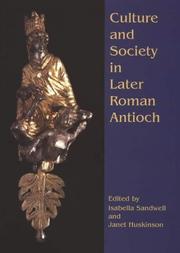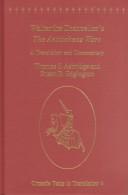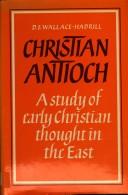| Listing 1 - 10 of 31 | << page >> |
Sort by
|

ISBN: 184217102X Year: 2004 Publisher: Oxford Oxbow
Abstract | Keywords | Export | Availability | Bookmark
 Loading...
Loading...Choose an application
- Reference Manager
- EndNote
- RefWorks (Direct export to RefWorks)
Conferences - Meetings --- Antioch (Turkey) --- Civilization --- Intellectual life --- Antioch --- Antakya (Turkey) --- Antakiya (Turkey) --- Antiokhii︠a︡ (Turkey) --- Antiokheia (Turkey) --- Antakye (Turkey) --- Antakiyah (Turkey) --- Antioche (Turkey) --- Antioch on the Orontes (Turkey) --- Hatay (Turkey) --- Antiochea (Turkey) --- Antiochia (Turkey) --- Antiocheia (Turkey) --- Antiochia Syriae (Turkey)
Book
ISBN: 1400876710 9781400876716 Year: 2015 Publisher: Princeton, NJ
Abstract | Keywords | Export | Availability | Bookmark
 Loading...
Loading...Choose an application
- Reference Manager
- EndNote
- RefWorks (Direct export to RefWorks)
This study incorporates findings of the 1932-1939 excavations. Originally published in 1962.The Princeton Legacy Library uses the latest print-on-demand technology to again make available previously out-of-print books from the distinguished backlist of Princeton University Press. These editions preserve the original texts of these important books while presenting them in durable paperback and hardcover editions. The goal of the Princeton Legacy Library is to vastly increase access to the rich scholarly heritage found in the thousands of books published by Princeton University Press since its founding in 1905.
SOCIAL SCIENCE / Archaeology. --- Antioch (Turkey) --- Antioch --- Antakya (Turkey) --- Antakiya (Turkey) --- Antiokhii︠a︡ (Turkey) --- Antiokheia (Turkey) --- Antakye (Turkey) --- Antakiyah (Turkey) --- Antioche (Turkey) --- Antioch on the Orontes (Turkey) --- Hatay (Turkey) --- Antiochea (Turkey) --- Antiochia (Turkey) --- Antiocheia (Turkey) --- Antiochia Syriae (Turkey) --- History.
Book
ISBN: 1108938477 1108945635 110883714X 1108944876 1108940374 Year: 2021 Publisher: Cambridge : Cambridge University Press,
Abstract | Keywords | Export | Availability | Bookmark
 Loading...
Loading...Choose an application
- Reference Manager
- EndNote
- RefWorks (Direct export to RefWorks)
Antioch in Syria critically reassesses this ancient city from its Seleucid foundation into Late Antiquity. Although Antioch's prominence is famous, Kristina M. Neumann newly exposes the gradations of imperial power and local agency mediated within its walls through a comprehensive study of the coins minted there and excavated throughout the Mediterranean and Middle East. Patterns revealed through digital mapping and Exploratory Data Analysis serve as a significant index of spatial politics and the policies of the different authorities making use of the city. Evaluating the coins against other historical material reveals that Antioch's status was not fixed, nor the people passive pawns for external powers. Instead, as imperial governments capitalised upon Antioch's location and amenities, the citizens developed in their own distinct identities and agency. Antioch of the Antiochians must therefore be elevated from traditional narratives and static characterisations, being studied and celebrated for the dynamic polis it was.
Coins, Roman --- Antioch (Turkey) --- Antiquities. --- History. --- Roman coins --- Antioch --- Antakya (Turkey) --- Antakiya (Turkey) --- Antiokhii︠a︡ (Turkey) --- Antiokheia (Turkey) --- Antakye (Turkey) --- Antakiyah (Turkey) --- Antioche (Turkey) --- Antioch on the Orontes (Turkey) --- Hatay (Turkey) --- Antiochea (Turkey) --- Antiochia (Turkey) --- Antiocheia (Turkey) --- Antiochia Syriae (Turkey)

ISBN: 1840142634 Year: 1999 Volume: 4 Publisher: Aldershot Ashgate
Abstract | Keywords | Export | Availability | Bookmark
 Loading...
Loading...Choose an application
- Reference Manager
- EndNote
- RefWorks (Direct export to RefWorks)
Medieval Latin literature --- anno 1000-1099 --- anno 1100-1199 --- Antakya --- Galterius Chancellor of Antioch --- Antioch (Principality) --- -History --- Galterius, --- Antioch (Turkey) --- Antioch --- Antakya (Turkey) --- Antakiya (Turkey) --- Antiokhii︠a︡ (Turkey) --- Antiokheia (Turkey) --- Antakye (Turkey) --- Antakiyah (Turkey) --- Antioche (Turkey) --- Antioch on the Orontes (Turkey) --- Hatay (Turkey) --- Antiochea (Turkey) --- Antiochia (Turkey) --- Antiocheia (Turkey) --- Antiochia Syriae (Turkey) --- History. --- Galterius --- Antiochia (Principality) --- History
Book
ISBN: 1316547248 1316547574 1316547906 1316549550 1316548236 1316442632 Year: 2016 Publisher: Cambridge : Cambridge University Press,
Abstract | Keywords | Export | Availability | Bookmark
 Loading...
Loading...Choose an application
- Reference Manager
- EndNote
- RefWorks (Direct export to RefWorks)
From late fourth century BC Seleucid enclave to capital of the Roman east, Antioch on the Orontes was one of the greatest cities of antiquity and served as a hinge between east and west. This book draws on a century of archaeological fieldwork to offer a new narrative of Antioch's origins and growth, as well as its resilience, civic pride, and economic opportunism. Situating the urban nucleus in the context of the rural landscape, this book integrates hitherto divorced cultural basins, including the Amuq Valley and the Massif Calcaire. It also brings into focus the archaeological data, thus proposing a concrete interpretative framework that, grounded in the monuments of Antioch, enables the reader to move beyond text-based reconstructions of the city's history. Finally, it considers the interaction between the environment and the people of the city who shaped this region and forged a distinct identity within the broader Greco-Roman world.
Excavations (Archaeology) --- Archaeological digs --- Archaeological excavations --- Digs (Archaeology) --- Excavation sites (Archaeology) --- Ruins --- Sites, Excavation (Archaeology) --- Archaeology --- Antioch (Turkey) --- History. --- Antiquities. --- Antioch --- Antakya (Turkey) --- Antakiya (Turkey) --- Antiokhii︠a︡ (Turkey) --- Antiokheia (Turkey) --- Antakye (Turkey) --- Antakiyah (Turkey) --- Antioche (Turkey) --- Antioch on the Orontes (Turkey) --- Hatay (Turkey) --- Antiochea (Turkey) --- Antiochia (Turkey) --- Antiocheia (Turkey) --- Antiochia Syriae (Turkey)
Book
ISBN: 3515086463 Year: 2004 Volume: Bd. 18 Publisher: Stuttgart Steiner
Abstract | Keywords | Export | Availability | Bookmark
 Loading...
Loading...Choose an application
- Reference Manager
- EndNote
- RefWorks (Direct export to RefWorks)
Cities and towns, Ancient. --- Villes antiques --- Libanius. --- Libanius --- Criticism and interpretation. --- Antioch (Turkey) --- Antioche (Turquie) --- History. --- Histoire --- Cities and towns, Ancient --- Geography, Ancient --- Libanios --- Antioch --- Antakya (Turkey) --- Antakiya (Turkey) --- Antiokhii︠a︡ (Turkey) --- Antiokheia (Turkey) --- Antakye (Turkey) --- Antakiyah (Turkey) --- Antioche (Turkey) --- Antioch on the Orontes (Turkey) --- Hatay (Turkey) --- Antiochea (Turkey) --- Antiochia (Turkey) --- Antiocheia (Turkey) --- Antiochia Syriae (Turkey) --- Livaniĭ --- Libanio
Book
ISBN: 9780367633042 9781138845244 1138845248 0367633043 9781315727608 1315727609 9781317540427 1317540425 9781317540410 1317540417 9781317540403 1317540409 Year: 2021 Publisher: London Routledge
Abstract | Keywords | Export | Availability | Bookmark
 Loading...
Loading...Choose an application
- Reference Manager
- EndNote
- RefWorks (Direct export to RefWorks)
The Eagle of Zeus Arrives (303 BCE-64 BCE) -- Orientis Apex Pulcher : The Roman "Beautiful Crown of the East" in the making (64 BCE 192CE) -- From Capital to Crisis : Antioch in the Late Roman Empire (193-458 CE) -- Theoupolis, the City of God (458-638) -- Anṭākiya, Mother of the Frontier (638-969) -- The Byzantine Duchy of Antioch (969-1085) -- The Saljūqs : An Interlude (1084-1098) -- The Crusader Principality of Antioch (1098-1268) -- A Mamlūk Entrepot (1268-1516) -- Ottoman Antakya (1516-1918) -- A Frontier Town Once More (1920-2020). "This is a complete history of Antioch, one of the most significant major cities of the eastern Mediterranean and a crossroads for the Silk Road, from its foundation by the Seleucids, through Roman rule, the rise of Christianity, Islamic and Byzantine conquests, to the Crusades and beyond. Antioch has typically been treated as a city whose classical glory faded permanently amid a series of natural disasters and foreign invasions in the sixth and seventh centuries C.E. Such studies have obstructed the view of Antioch's fascinating urban transformations from classical to medieval to modern city and the processes behind these. Through its comprehensive blend of textual sources and new archaeological data reanalyzed from Princeton's 1930s excavations and recent discoveries, this book offers unprecedented insights into the complete history of Antioch, recreating the lives of the people who lived in it and focusing on the factors that affected them during the evolution of its remarkable cityscape. While Antioch's built environment is central, the book also utilizes landscape archaeological work to consider the city in relation to its hinterland, and numismatic evidence to explore its economics. The outmoded portrait of Antioch as a sadly perished classical city par excellence gives way to one in which it shines as brightly in its medieval Islamic, Byzantine, and Crusader incarnations. Antioch: A History offers a new portal to researching this long-lasting city and is also suitable for a wide variety of teaching needs, both undergraduate and graduate, in the fields of Classics, History, Urban Studies, Archaeology, Silk Road Studies, and Near Eastern/Middle Eastern Studies. Just as important, its clarity makes it attractive for, and accessible to, a general readership outside the framework of formal instruction"
Excavations (Archaeology) --- Archaeological digs --- Archaeological excavations --- Digs (Archaeology) --- Excavation sites (Archaeology) --- Ruins --- Sites, Excavation (Archaeology) --- Archaeology --- Antioch (Turkey) --- Antioch --- Antakya (Turkey) --- Antakiya (Turkey) --- Antiokhii︠a︡ (Turkey) --- Antiokheia (Turkey) --- Antakye (Turkey) --- Antakiyah (Turkey) --- Antioche (Turkey) --- Antioch on the Orontes (Turkey) --- Hatay (Turkey) --- Antiochea (Turkey) --- Antiochia (Turkey) --- Antiocheia (Turkey) --- Antiochia Syriae (Turkey) --- History. --- Antiquities. --- Excavations (Archaeology). --- Turkey
Book
ISBN: 9781108837149 9781108938471 9781108940375 1108938477 Year: 2021 Publisher: Cambridge Cambridge University Press
Abstract | Keywords | Export | Availability | Bookmark
 Loading...
Loading...Choose an application
- Reference Manager
- EndNote
- RefWorks (Direct export to RefWorks)
"Antioch in Syria critically reassesses this ancient city from its Seleucid foundation into Late Antiquity. Although Antioch's prominence is famous, Kristina Neumann newly exposes the gradations of imperial power and local agency mediated within its walls through a comprehensive study of the coins minted there and excavated throughout the Mediterranean and Middle East. Patterns revealed through digital mapping and Exploratory Data Analysis serve as a significant index of spatial politics and the policies of the different authorities making use of the city. Evaluating the coins against other historical material reveals that Antioch's status was not fixed, nor the people passive pawns for external powers. Instead, as imperial governments capitalised upon Antioch's location and amenities, the citizens developed in their own distinct identities and agency. Antioch of the Antiochians must therefore be elevated from traditional narratives and static characterisations, being studied and celebrated for the dynamic polis it was"--
Coins, Roman --- Antiquities. --- Coins, Roman. --- Antioch (Turkey) --- Turkey --- History. --- Roman coins --- Antioch --- Antakya (Turkey) --- Antakiya (Turkey) --- Antiokhii︠a︡ (Turkey) --- Antiokheia (Turkey) --- Antakye (Turkey) --- Antakiyah (Turkey) --- Antioche (Turkey) --- Antioch on the Orontes (Turkey) --- Hatay (Turkey) --- Antiochea (Turkey) --- Antiochia (Turkey) --- Antiocheia (Turkey) --- Antiochia Syriae (Turkey)
Book
ISBN: 9786055250263 6055250268 Year: 2014 Publisher: Istanbul Koç Universitesi Yayınları
Abstract | Keywords | Export | Availability | Bookmark
 Loading...
Loading...Choose an application
- Reference Manager
- EndNote
- RefWorks (Direct export to RefWorks)
"Koç University's Research Center for Anatolian Civilizations (RCAC) hosts the exhibition Antioch on the Orontes, Early Explorations in the City of Mosaics. Curated by Murat Akar, the exhibition presents photographs from the first archaeological excavations carried out by Princeton University in Antioch between 1932 and 1939. These eight excavation seasons constitute the most comprehensive archaeological work in the region at the time, and the photographs on display document the discovery of the world-famous mosaics now in the Hatay Archaeological Museum and of other artifacts from Ancient Antioch. Moreover, Antioch on the Orontes, Early Explorations in the City of Mosaics provides clues about the excavation methods and archiving techniques of the 1930s"--Publisher's website.
Excavations (Archaeology) --- Mosaics, Roman --- Fouilles (Archéologie) --- Mosaïque romaine --- Antioch (Turkey) --- Antioche (Turquie) --- Antiquities. --- Antiquities, Roman. --- Antiquités --- Antiquités romaines --- Antioch --- Antakya (Turkey) --- Antakiya (Turkey) --- Antiokhii︠a︡ (Turkey) --- Antiokheia (Turkey) --- Antakye (Turkey) --- Antakiyah (Turkey) --- Antioche (Turkey) --- Antioch on the Orontes (Turkey) --- Hatay (Turkey) --- Antiochea (Turkey) --- Antiochia (Turkey) --- Antiocheia (Turkey) --- Antiochia Syriae (Turkey)

ISBN: 0521234255 0521094364 0511555342 9780521234252 9780511555343 9780521094368 Year: 1982 Publisher: Cambridge Cambridge University press
Abstract | Keywords | Export | Availability | Bookmark
 Loading...
Loading...Choose an application
- Reference Manager
- EndNote
- RefWorks (Direct export to RefWorks)
This book is a comprehensive survey of the history and, more particularly, of the thought of Antioch from the second to the eighth centuries of the Christian era. Dr Wallace-Hadrill traces the religious background of Antiochene Christianity and examines in detail aspects of its intellectual life: the exegesis of scripture, the interpretation of history, philosophy, and the doctrine of the nature of God as applied to an understanding of Christ and man's salvation. The community at Antioch stressed history and literalism, in self-conscious opposition to the tendency to allegorise that prevailed at Alexandria. While insisting on the divinity of Christ, they were equally adamant that no other doctrine should be allowed to compromise their central belief that Jesus was really human.
Antiochian School --- Ecole d'Antioche --- Antioch (Turkey) --- Antioche (Turquie) --- Church history. --- Histoire religieuse --- Antiochian school --- Church history --- 276.016.0 x --- Antioch, School of --- Antiochene school --- Antiochian theology --- Theology, Doctrinal --- Alexandrian school, Christian --- Patrologie. Patristiek--?.016--?.0 --- History --- -Church history --- Antiochian school. --- Antioch --- Antakya (Turkey) --- Antakiya (Turkey) --- Antiokhii︠a︡ (Turkey) --- Antiokheia (Turkey) --- Antakye (Turkey) --- Antakiyah (Turkey) --- Antioche (Turkey) --- Antioch on the Orontes (Turkey) --- Hatay (Turkey) --- Antiochea (Turkey) --- Antiochia (Turkey) --- Antiocheia (Turkey) --- Antiochia Syriae (Turkey) --- Arts and Humanities --- Religion --- Antioch (Turkey) - Church history
| Listing 1 - 10 of 31 | << page >> |
Sort by
|

 Search
Search Feedback
Feedback About UniCat
About UniCat  Help
Help News
News